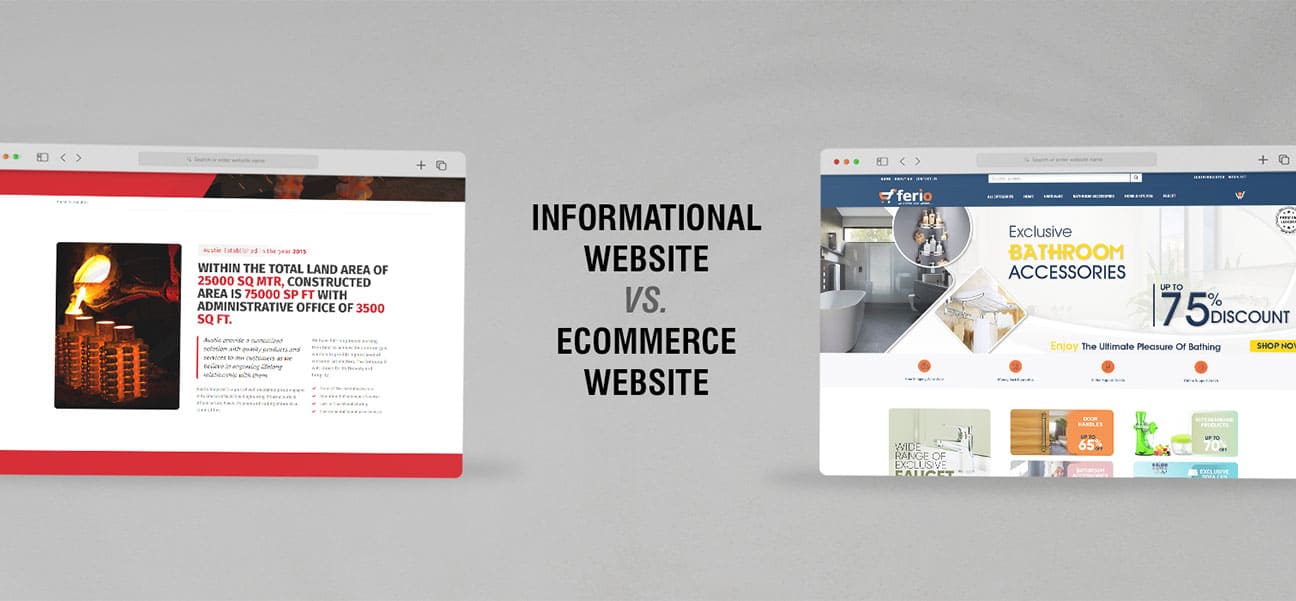LATEST
ARTICAL
Blog 25 Febuary, 2021
Informational Website vs. Ecommerce
The world today is all about websites. Almost all businesses have websites and the ones who do not are missing out a great deal on potential growth. Did you know that there are different types of websites businesses can have? In this blog we will compare and contrast ecommerce websites versus informational websites. These both serve different purposes which is why they are so different.

Informational websites
Informational websites are exactly what their names states they are. They are there to provide information on a range of different topics. For example WebMD gives information about medical conditions. The main purpose of these websites for businesses is to give your audience the opportunity to learn more about who you are and what you do. They also provide a place for people and or businesses to show off samples of their work or products in the form of videos or photos.
E-commerce websites
E-commerce websites are specifically for transactions. Which can include, but are not limited to retail stores, business-to-business services, financial management sites, and music sites etc. Some of the most popular e-commerce websites in the world today are Amazon, iTunes and Ebay. Through these websites customers have the ability to make purchases directly from your business.
In a nutshell, the major difference between the two is their function. An informational site may advertise or provide information about a product or service, but transactions are made offline, usually in store. Whereas an e-commerce site, while providing the same information, goes a bit further because it sells a product or service online.
Website Security
e-commerce allows individuals to share payment information with a business website in exchange for products. Individuals are trusting these e-commerce websites to protect their information in a way that keeps it safe from hackers. This requires e-commerce websites to have an SSL encryption certificate which provides buyers with the protection while shopping online. A regular website that does not require sharing confidential information requires less protection.
Website Functionality
Regular websites and e-commerce websites require different frameworks. Therefore each website will need a different level and type of programming. E-commerce websites are made for users to shop. The users browse through numerous items, make a cart and checkout all from within the website. E-commerce sites must also have the ability to ship items to the homes and businesses of the buyer. This requires a back-end development, which means development of server-side logic that powers websites from behind the scenes. Along with automatic updates providing the quantity of all remaining products, the variation of remaining products, as well as a system that is set up specially for your business to ship out the purchased items. Regular websites require far less for the simple fact that they are not selling anything.
SEO
SEO for E-commerce is a much more kept process than it is for a regular website. Because new products are added to an e-commerce website frequently, the person in charge of SEO must be sure to update the website on a regular basis. It needs to be updated to be sure it receives the greatest potential for online visibility. Regular websites, while still in need of the assistance of SEO, do not need to be updated as frequently. Therefore they can be left untouched for up to a week before there is the need to be refreshed.
Reasons to have a informational website:
- You are not selling any digital products
- The users of your site are not looking to buy online
- You have a lot of information and samples to show to potential customers
Reasons to have an e-commerce website:
- You have products or services available for online purchase
- Customer convenience
- A broad range of potential customers
E-commerce websites and informational websites are two very different types of websites. They each take on a different role on the internet as you can gather from the above information. While both require some type of development work, the level that goes into each varies. One involves a great deal of web design and development, whereas the other can be attained through minimal effort. The type of business you have is the determining factor in which type of website you will need.
